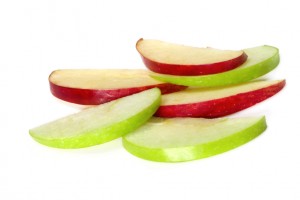The Center for Food Safety has started a petition asking the USDA to not approve the Arctic apple. That apple, a product of Okanagan Specialty Fruit, a Canadian company, does not turn brown when cut. Many apple varieties turn brown when they are cut because an enzyme in the fruit, along with phenols, react with oxygen to produce the brown color. (There’s a simple way to slow this process; just brush the fruit with lemon juice.)
 The organization says that this genetic engineering (GE) could “cause contamination of nearby organic or conventional apple orchards.” Then, those apples, which would be unlabeled, could be incorporated into products such as apple sauce, juice, and baby foods at the processing level. Children and babies who eat those foods are at increased risk for any adverse health effects from genetic engineering.
The organization says that this genetic engineering (GE) could “cause contamination of nearby organic or conventional apple orchards.” Then, those apples, which would be unlabeled, could be incorporated into products such as apple sauce, juice, and baby foods at the processing level. Children and babies who eat those foods are at increased risk for any adverse health effects from genetic engineering.
Most genetically engineered foods are used as ingredients in processed foods. This apple could become the first GMO food served as-is to the public. Some growers think that this change could lead to a perception that apples are not natural or healthy.
According to the Center, the U.S. Apple Association, Northwest Horticultural Council, and the British Columbia Fruit Growers Association do not want these apples approved. You can find the petition at the Center for Food Safety. There is a public comment period on Okanagan’s application that is open until September 11, 2012. You can find the document at the Federal Register; to comment on it, click the blue “Comment Now!” button at the top right hand part of the page.





Why are they afraid of genetically engineered apples? The only change to the apple is that the four genes responsible for the enzymatic browning are turned off. There are no foreign genes inserted into the apple. They used apple genes to do this. There is no possibility of contaminating nearby apple trees with this either–what is there to contaminate it with? Bees cross-pollinate all the time (but in a very limited way) and there is a possibility of having pollen from some genetically engineered apples with those that are not genetically engineered. This would only be present in the seeds which are not eaten nor used for propagation. Please consider genetically modified apples scientifically rather than based on fear. I am a young person who is working on a small orchard in the northeast and realize first hand how challenging apple-growing is. It has become increasingly difficult and I see a growing disconnect between consumers knowledge and the reality we face in the orchard everyday. We hate to spray too, but are forced to do it in order to have any crop. We need all the tools in the toolbox and this may include some genetic- engineering.